home | internet service | web design | business directory | bulletin board | advertise | events calendar | contact | weather | cams

|
Small farming in the Methow 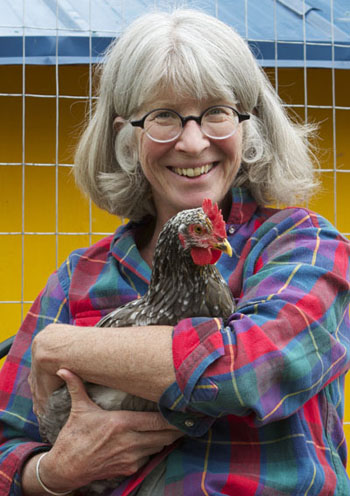 Jane Gilbertsen holds Princess Madeleine of Sweden, a Swedish Flower Hen, while sitting in front of a coop painted in the colors of the Swedish flag. Jane Gilbertsen holds Princess Madeleine of Sweden, a Swedish Flower Hen, while sitting in front of a coop painted in the colors of the Swedish flag.PART FOUR OF A SERIES There are ordinary chickens and there are Jane Gilbertsen’s chickens. On a farm south of Winthrop she is raising at least 15 breeds of birds that come in a virtual kaleidoscope of feathered cloaks. They have exotic breed names—Cream Legbar, Blue Isbar, Swedish Flower Hen, Partridge Chanticler, Delaware and Silkie among others—too many beaks and breeds to keep an accurate count. And they lay eggs in a palette ranging from creamy white to baby blue and sage green to rich reddish brown. Gilbertsen’s pampered fowl live in about a dozen coops friends have dubbed the “Taj Mahal” of chicken shelters where they are safe from predators, enjoy the best of organic diets and range freely indoors and out. “I’m very much a sentimentalist about animals,” says Gilbertsen. “It’s important to me to have a relationship with animals and see what’s going on.” 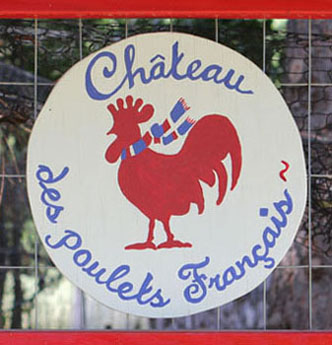 The French breeds reside in their appropriately named Chateau des Poulets Francais (House of French Chickens). Gilbertsen grew up in a house without pets but says she knew that ultimately she would have animals and a big garden. The French breeds reside in their appropriately named Chateau des Poulets Francais (House of French Chickens). Gilbertsen grew up in a house without pets but says she knew that ultimately she would have animals and a big garden.A woman of multitudinous interests, Gilbertsen says her chicken hobby started about five years ago, when to ward off the wintertime blues, she started a “chicken group” of people interested in raising chickens and sharing what they knew. “About every 10 years I need a new hobby,” the retired Seattle attorney explains. “I like to research and I like to meet people who know [about a subject]. That’s part of the fun.” Given that chickens have been domesticated for 4,000 years or so, and that there are 400 breeds just in the United States, chickens obviously provide endless research possibilities. Gilbertsen’s quest for knowledge has taken her to the Royal Highland Show in Edinburgh, Scotland, and to an all Great Britain show in England as well as to Twisp for this year’s Sustainable Small Farm course. 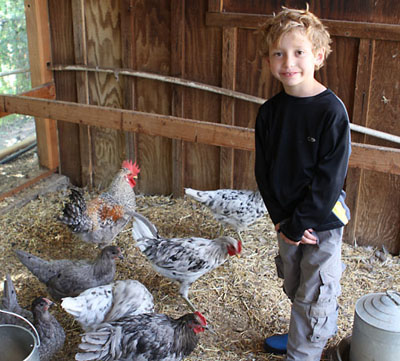 Jack Nourse, 7, Jane Gilbertsen’s grandson, says he wants to be a chicken farmer in Winthrop when he grows up. He loves to come help his grandmother. Here he poses with some of her Blue Isbars and Cream Legbars, which are the darker colored birds. Jack Nourse, 7, Jane Gilbertsen’s grandson, says he wants to be a chicken farmer in Winthrop when he grows up. He loves to come help his grandmother. Here he poses with some of her Blue Isbars and Cream Legbars, which are the darker colored birds.“I’ve given up any thought of income production,” she told her classmates. “The birds I have take a lot of time and money to raise.” Her goal, she says, is “to develop a couple of heritage breeds of chickens that will do well if we ever have an event,” by which she means a natural or human-caused disaster, that forces us to grow our own food. She also is helping supply and mentor others in the valley who are interested in raising heritage breeds. She wants friendly birds that produce meat as well as eggs. “It’s a mission of love and fun,” she says, “and an experiment in animal relationships. Every grouping has its own dynamics.” Gilbertsen had no rural or farm life experience before moving to the Methow Valley from Seattle. She says she grew up in a Minneapolis house without pets, but in a time when children spent many hours outdoors playing and exploring on their own. Kids in her neighborhood hung out at a nearby swampy pond, collected salamanders and once rescued a baby duck that imprinted on them and followed them everywhere, she says. 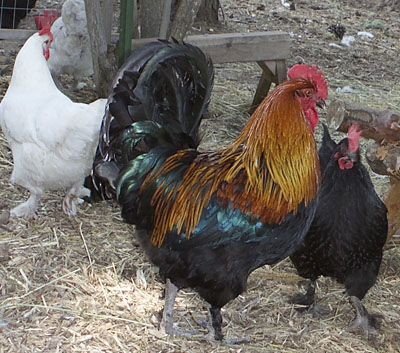 Jacque, a Black Copper Marans, lives in the French chateau. “He’s nice. He doesn’t peck,” says Jack Nourse. The same cannot be said for at least one of the hens Jacque oversees. Jacque, a Black Copper Marans, lives in the French chateau. “He’s nice. He doesn’t peck,” says Jack Nourse. The same cannot be said for at least one of the hens Jacque oversees.The original Nourse Farm was established in 1722 in New England and is one of the oldest continuously operating family farms in the country, says Gilbertsen by way of explaining the Nourse lineage. (Rebecca Nurse, the grandmother of the founding family, was an innocent victim of the Salem Witchcraft Trials. “The Crucible” by playwright Arthur Miller immortalized her story.) The couple met when both were in law school in Seattle. Nourse, a “total outdoor guy,” and Gilbertsen, who is now 60, first came to the Methow Valley to escape the rain, she says. They bought land in 1985 and built an earth-bermed, log house that “fit all these romantic notions you have as a city person.” The reality was that she spent almost all her time on weed control -- pulling and spraying weeds—and doing something about the “sea of dirt, horrible dirt” surrounding the house. “I knew that ultimately I would have animals and a big garden,” says Gilbertsen, who became a King County Master Gardener as the result of an earlier hobby. After 15 years of commuting back and forth to Seattle for her law practice, she retired in 1999. Nourse, 64, continues to practice law and is still commuting. “He supports me and is very supportive of what I’m doing,” Gilbertsen says. Their farm is divided into residential and agricultural zones plus a fenced off riparian area placed in a conservation easement. The gardens include fruit trees, raspberries and blueberries, herb beds, vegetable plots and flowers. Gilbertsen still gets misty-eyed recalling the first time she planted a seed and saw a sprout appear. “It was the miracle of life, right there.” And then there are the animals—two dogs, one Fjord horse, four mules, two Mammoth donkeys and the chickens. One of Gilbertsen’s lifelong fascinations is the question of whether there is interspecies altruism among animals. “I hope there is or we’re all doomed,” she says. One of her pleasures is listening to her animals and learning from their communication. While she was growing up there was one time she was allowed to keep a caged hamster in the basement. She remembers writing a true short story titled “The Friendly Hamster and the Hungry Squirrel” about the hamster sharing its food with a squirrel that had fallen down the chimney of her parents’ house and found itself in the basement. Was the hamster a messy eater who accidently flung food on the floor? Or did the hamster help an animal of another species by consciously pushing some of its own food onto the floor to feed the stranded squirrel? These are the kinds of questions that fascinate her. It’s too early in her chicken adventure to know which breeds Gilbertsen will continue to raise. She’s fond of the Delawares because they are a “super robust” dual-purpose breed raised for eggs and meat and “they have the disposition I’m looking for. They run toward you instead of away.” But she loves variety. And because she can afford them, she will continue to indulge herself by keeping “interesting and rare chickens.” Gilbertsen’s original plan was to go into the chicken business and at least “balance out to zero” the cost of her birds, their feed, the coops and equipment. She now realizes that selling eggs, which she does from her house at $5 a dozen, won’t get her there. She also sells fertile eggs to fellow chicken enthusiasts but on a very limited scale. It’s not unusual to find a small pen of newly hatched chicks on her kitchen counter. And she sometimes looks for homes for “exceptional roosters of good character.” She told her Sustainable Small Farm course classmates that the things she’s undertaken never really have income potential. “There is no money in this organic gardening stuff,” she told Grist. “People who are really good at growing things are hardly ever good at marketing and without a marketing plan you will never make money… You do it for your own reasons. Just don’t do it for money.”
NEXT (in part five): Meet Jennifer Hover, a stay-at-home mom who is raising and selling specialty beef through her Hover Highland Cattle Co.
8/29/2013 Comments
|

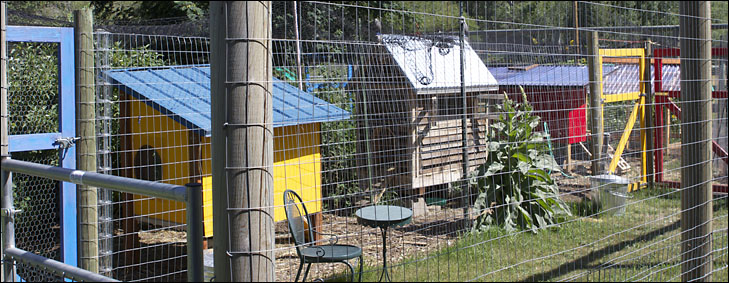 Some of Gilbertsen’s chicken coops are colorfully painted and artfully decorated.
Some of Gilbertsen’s chicken coops are colorfully painted and artfully decorated.